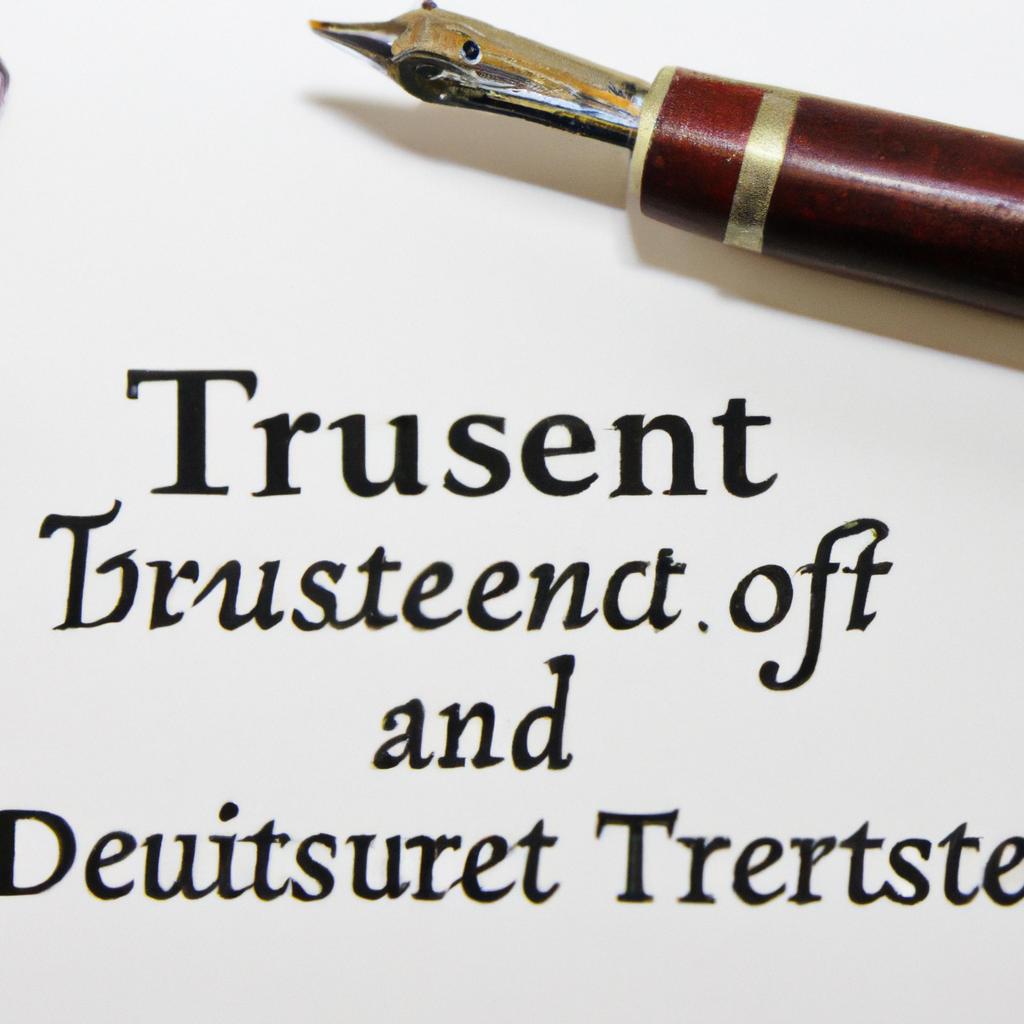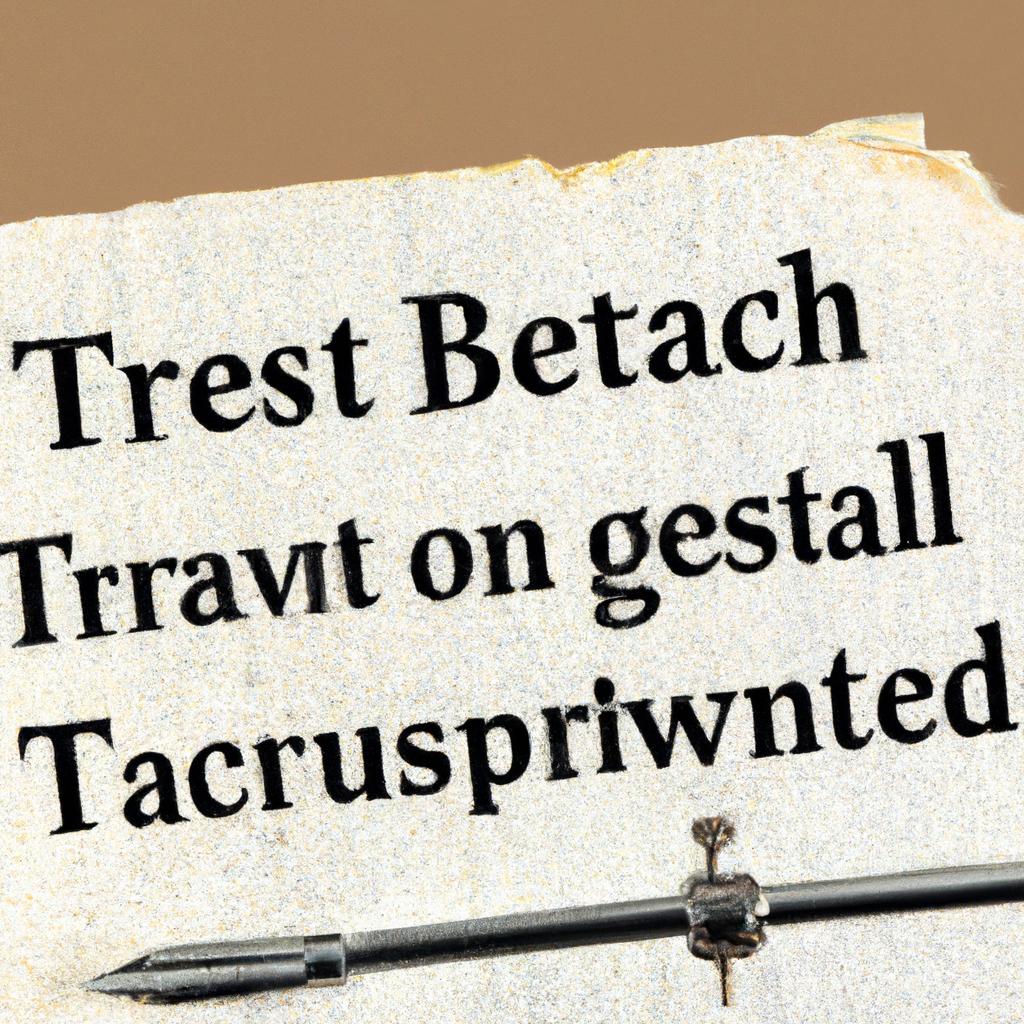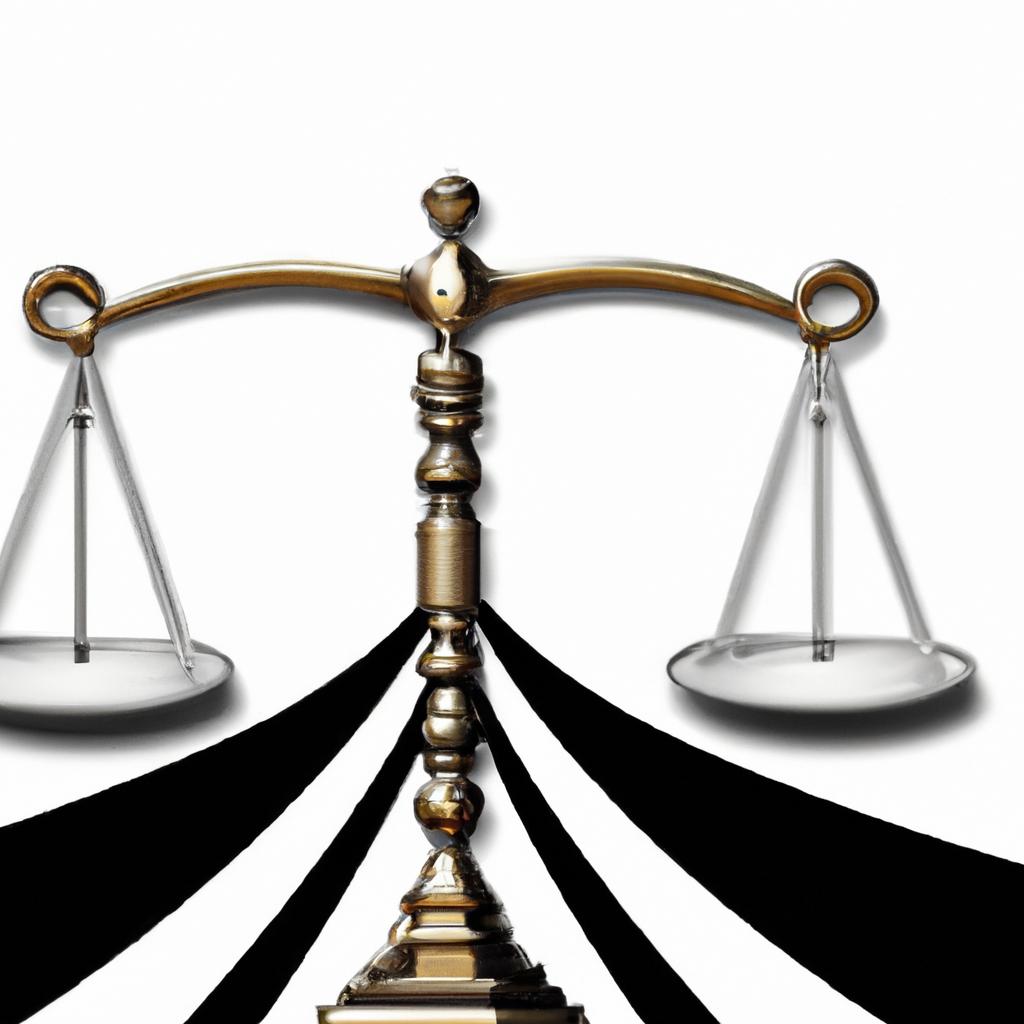In the intricate world of real estate transactions, the concept of a trustor often plays a pivotal role. As experienced legal professionals at Morgan Legal Group in New York City, we understand the complexities surrounding deeds of trust and the importance of delineating the roles of each party involved. In this article, we will delve into the question, “In a deed of trust, who is the trustor?” to shed light on the key responsibilities and obligations of this fundamental entity. Join us as we unravel the nuances of this crucial aspect of property ownership and explore the legal implications for all parties involved.
Understanding the role of the Trustor in a Deed of Trust
When it comes to , it is essential to grasp the key responsibilities and obligations that come with this title. The Trustor, also known as the grantor or settlor, plays a crucial role in the creation and execution of a Deed of Trust. This individual is the party who initiates the trust and transfers assets into it for the benefit of the Beneficiary.
The Trustor holds the legal title to the assets placed in the trust and has the power to make decisions regarding the management and distribution of those assets. In essence, the Trustor acts as the architect of the trust, setting the parameters and guidelines for how the trust operates and how the assets are utilized for the benefit of the Beneficiary. It is important for the Trustor to carefully consider their goals and intentions when establishing a trust to ensure that their wishes are carried out effectively.

Key Considerations when Identifying the Trustor in a Deed of Trust
When identifying the trustor in a deed of trust, it is important to consider several key factors. The trustor is the party that transfers legal title to a trustee for the benefit of a beneficiary. This individual or entity plays a crucial role in the trust agreement and must be correctly identified to ensure the validity and enforceability of the deed.
Here are some key considerations to keep in mind when identifying the trustor in a deed of trust:
- Legal Capacity: The trustor must have the legal capacity to enter into a trust agreement. This means they must be of sound mind and of legal age.
- Trust Intent: The trustor must clearly intend to create a trust agreement, transferring legal title to the trustee for the benefit of the beneficiary.
- Proper Identification: It is essential to accurately identify the trustor by their full legal name and any relevant identifying information.

Implications of being the Trustor in a Deed of Trust
In a deed of trust, the trustor is the individual who borrows money from a lender and transfers legal title of the property to a trustee until the loan is fully paid off. As the trustor, you are essentially the borrower in this arrangement, and your primary role is to repay the loan according to the terms and conditions outlined in the deed of trust.
<p>Being the trustor in a deed of trust comes with several implications that you should be aware of:</p>
<ul>
<li><strong>Responsibility for Loan Repayment:</strong> As the trustor, you are responsible for repaying the loan in full, including interest, within the specified period.</li>
<li><strong>Risk of Foreclosure:</strong> If you fail to make timely payments, the lender may initiate the foreclosure process, leading to the loss of your property.</li>
<li><strong>Legal Obligations:</strong> You must adhere to all the terms and conditions outlined in the deed of trust to avoid any legal consequences.</li>
</ul>

Expert Recommendations for Trustors in Deeds of Trust
When it comes to deeds of trust, the trustor plays a crucial role in the legal process. The trustor is the individual or entity that creates the trust by transferring their property into the trust. In simpler terms, they are the ones who are establishing the trust and putting their assets into it for the benefit of the beneficiaries.
As legal experts in estate planning and trust law, we recommend that trustors carefully consider their choice of trustees, beneficiaries, and the terms of the trust itself. It is essential for trustors to clearly outline their intentions and wishes regarding their assets and how they should be managed and distributed. Seeking professional guidance from experienced attorneys like the team at Morgan Legal Group can help trustors navigate the complexities of deeds of trust and ensure that their wishes are carried out effectively.
Q&A
Q: In a deed of trust, who is the trustor?
A: The trustor, also known as the grantor or settlor, is the individual or entity that conveys legal title to a trustee for the benefit of a beneficiary.
Q: What is the role of the trustor in a deed of trust?
A: The trustor is responsible for initiating the creation of the trust and transferring legal ownership of the property to the trustee.
Q: Can the trustor also be the beneficiary in a deed of trust?
A: Yes, it is possible for the trustor to also be the beneficiary. This type of arrangement is known as a revocable trust, where the trustor retains control over the assets.
Q: What are some examples of situations where the trustor may be an entity instead of an individual?
A: The trustor can be a corporation, partnership, or any other legal entity that has the capacity to own property and create a trust.
Q: Are there any specific requirements for who can be named as the trustor in a deed of trust?
A: Generally, anyone with legal capacity to enter into a contract can serve as the trustor in a deed of trust. However, it is advisable to consult with a legal professional to ensure all requirements are met.
In Summary
In conclusion, understanding the role of the trustor in a deed of trust is crucial in the world of real estate transactions. Knowing that the trustor is the individual who borrows the funds and pledges the property as security can help both buyers and lenders navigate the complexities of property ownership. So next time you come across a deed of trust, remember the trustor and their significant role in the process.
 Deed of Trust: Exploring the Role of the Trustor
Deed of Trust: Exploring the Role of the Trustor
When it comes to buying or selling a property, there are various legal documents involved in the process. One of these documents is the deed of trust, which serves as a type of mortgage agreement in certain states. Typically, a deed of trust is used in place of a traditional mortgage when purchasing real estate. It involves three main parties: the borrower, the lender, and the trustor. In this article, we will take an in-depth look at the role of the trustor in a deed of trust, and its importance in the real estate transaction process.
Understanding a Deed of Trust
Before we dive into the specifics of the trustor’s role, let us first understand what a deed of trust is and how it differs from a traditional mortgage. A deed of trust is a legal document that serves as security for a loan, in which the borrower (also known as the trustor) transfers the property title to a trustee until the loan is fully paid off. In simpler terms, it is a type of mortgage that involves three parties instead of two, unlike traditional mortgages.
In a deed of trust, the trustor, which is the borrower, transfers the property title to a trustee, usually a third party not involved in the transaction, such as a title company or an attorney. The trustee then holds the title until the loan is repaid. Once the loan is fully paid off, the trustee releases the lien on the property back to the borrower, and the borrower regains full ownership of the property.
Who is the Trustor?
In a deed of trust, the trustor holds a crucial role as they are the party responsible for borrowing the money and placing a lien on their property. Essentially, the trustor is the borrower in the transaction. They are the ones seeking a loan from the lender to finance the purchase of the property, and their name will be listed on the deed of trust as the trustor. The trustor also has the legal responsibility to repay the loan as agreed upon in the terms and conditions of the deed of trust.
Additionally, the trustor’s role involves ensuring that the property used as collateral for the loan is free of any encumbrances. This means that there should be no other claims or mortgages on the property besides the one mentioned in the deed of trust. The trustor must also provide proof of ownership of the property and agree to the terms and conditions set in the deed of trust before the transaction can proceed.
Responsibilities of the Trustor
Apart from being the borrower and holding ownership of the property, the trustor has other responsibilities that must be fulfilled. These include:
– Making timely payments: As the borrower, the trustor must adhere to the repayment schedule and make payments on time. Failure to do so can result in penalties, fines, and even foreclosure.
– Ensuring property insurance: The trustor is responsible for insuring the property against any potential damage or loss. Property insurance is mandatory for any property used as collateral for a loan.
– Maintaining the property: The trustor is also responsible for the maintenance and upkeep of the property. The lender has the right to inspect the property from time to time to ensure that it is being well-maintained.
– Providing accurate information: The trustor must also provide accurate and truthful information to the lender and the trustee. Any false or misleading information can result in legal consequences.
Benefits of a Deed of Trust
The use of a deed of trust offers several benefits to both the lender and the borrower. Some of these benefits include:
– Faster foreclosure process: In the event of a default on the loan, the foreclosure process is typically quicker and less complicated with a deed of trust compared to a traditional mortgage. This is because there is no need to go through the court system, as the trustee already has the power to sell the property.
– Easier transfer of ownership: If the borrower decides to sell the property before paying off the loan, the transfer of ownership is easier and less expensive compared to a traditional mortgage. This is because the trustee already holds the property’s title and can quickly transfer it to the new owner.
– Flexibility in negotiating terms: A deed of trust allows for more customizable and flexible terms compared to a traditional mortgage, as the lender and the borrower have more freedom to negotiate the terms of the loan.
Practical Tips
If you are considering getting a loan, either as a borrower or a lender, here are some practical tips to keep in mind:
– Always seek the help of a professional: A deed of trust is a legally binding document, so it is essential to seek the help of a real estate attorney or a title company to ensure that the document is drafted correctly and that all parties’ rights are protected.
– Understand the terms and conditions: As a trustor, it is crucial to read and understand the terms and conditions of the deed of trust before signing it. If you have any doubts or questions, do not hesitate to seek clarification from a professional.
– Make timely payments: Timely payments are crucial in maintaining a good credit score and avoiding any potential penalties or foreclosure proceedings.
Conclusion
In summary, a deed of trust is a legal document used in place of a traditional mortgage in some states, and it involves three parties: the borrower, the lender, and the trustor. The trustor, which is the borrower, plays a crucial role in the transaction by borrowing the money, placing a lien on their property, and upholding certain responsibilities. It is essential to understand the role of the trustor and the responsibilities that come with it before entering into a deed of trust. Seeking the help of a professional and understanding the terms and conditions can help make the process smoother, and ensure a successful real estate transaction.

